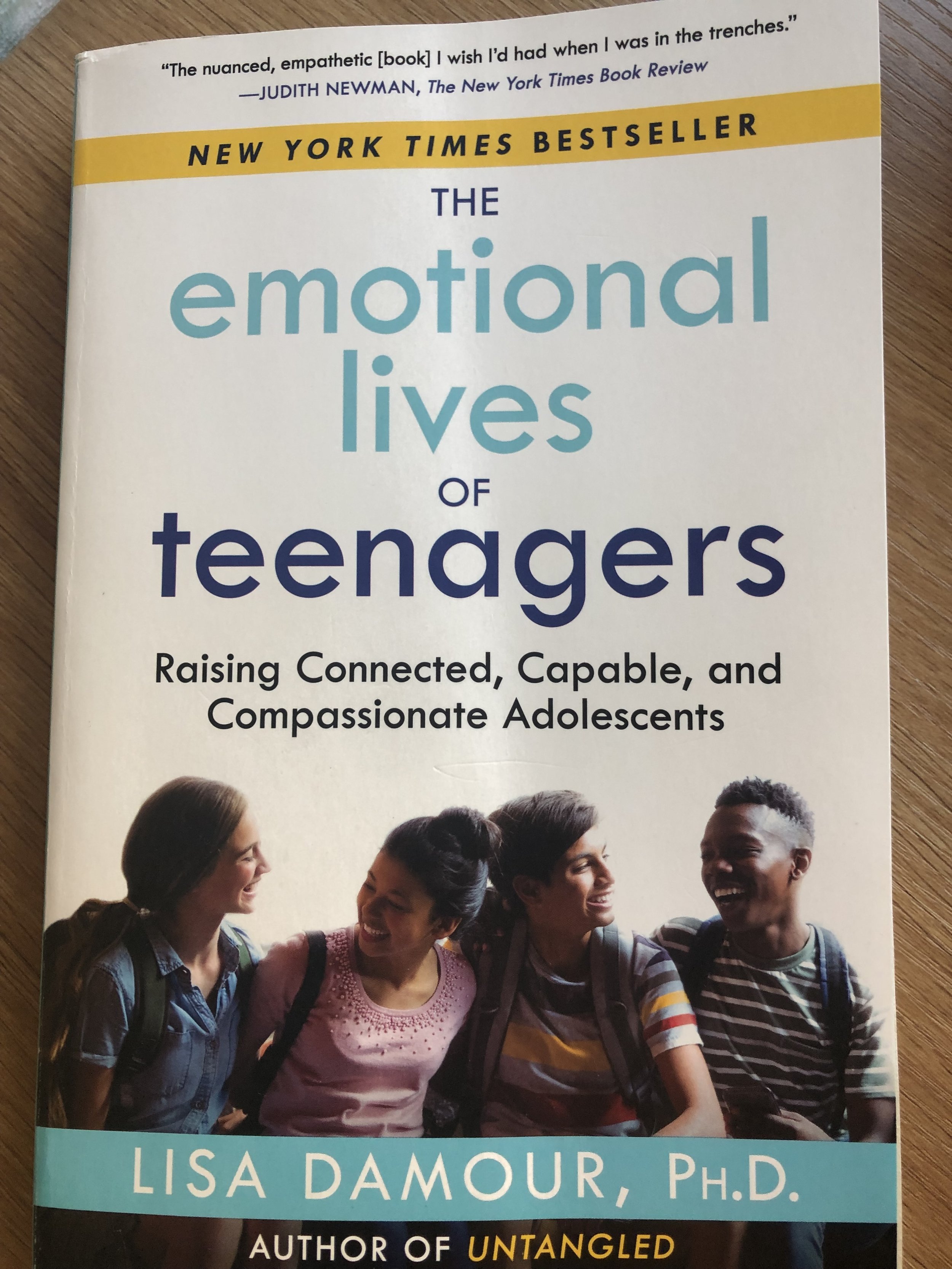What’s Dr. Allie Reading Now?
The Emotional Lives of Teenagers: Raising Connected, Capable, and Compassionate Adolescents by Dr. Lisa Damour
Who is this book for?
This is a great book for parents, caregivers, educators, extended family members, and anyone who wants to improve their relationships with the teens in their lives
Book Description:
Dr. Damour uses her years of clinical work with teens to present parents and caregivers with a “Teen Emotions 101” course in a relatable, easy-to-digest book. Teens tend to get a bad rap, so it’s helpful to remember that the developmental period we call “adolescence” is a time of significant growth between childhood and adulthood, when there is a lot going on, both internally and externally. The book begins by debunking 3 myths about teens and their emotions, which acts as a helpful reminder to readers to reconnect with what it was like to be an adolescent themselves and then clarify that emotions are normal, emotions can help us get in tune with our body and mind, that a lot can be learned from difficult emotions, and that teens are resilient beings. Dr. Damour shares caring examples that normalize teen emotion and behavior, while clarifying when seeking professional support may be a good idea.
Dr. Damour goes on to share foundational information about emotions and how they tend to be presented across gender, while focusing on how emotions change and evolve during adolescence. The heart of the book then dives into sharing tools for helping your teen manage their emotions by doing two things: 1) expressing their feelings and 2) managing their feelings. She gives a manual of sorts, filled with tools for encouraging your teen to express their emotions in safe, age-appropriate ways, and for helping your teen learn to manage their emotions using various tools typically only discussed in therapy rooms. It’s like cheat codes for parenting!
What Dr. Allie Loves About This Book:
First and foremost, I love that this book reminds the reader of the beauty involved in adolescence and to reconnect with what it was like to be a teen themselves while imagining what it would be like to be a teen in today’s world. It’s not the same as when you were a teen because times have changed, there are new versions of problems to navigate. But it’s similar in that - just as when you were a teen - their emotions are developing rapidly, all while they are working at being independent and still very much being reliant on parents at home.
Dr. Damour does an excellent job at normalizing teen emotions and behaviors. You teen rolls their eyes at you when you make a corny joke? Normal! Your teen doesn’t want to talk about a stressful exam right when they get into the car or home after school? Normal! Your teen doesn’t readily open up about their emotions? Normal!
Most teens love their caregivers AND want to figure out how to do things on their own. This is totally necessary because soon they will be young adults, trying to navigate this world on their own (even if they have some continued support from parents).
If you’re a parent or caregiver looking to improve your connection with and understanding of your teenager(s), then I highly recommend giving this book a read!
Action Steps You Can Take Today:
Talk to your teen about the importance of sleep and encourage them to prioritize quality sleep. Sleep impacts everything, from our mood, our ability to handle obstacles or stressors, to our ability to concentrate, to our metabolism and general ability to function in daily activities. Quality sleep = a solid foundation for being able to handle everyday life events.
Encourage teens to talk about their emotions without being too cringe. Empathy goes a long way here. Have open conversations with your teens in which you explore open-ended questions about their activities and well-being. Try to manage any immediate judgments or strong opinions you might have in order to provide an empathetic response, which can still include boundaries you would set as a parent or even opinions from your own experiences. Taking a moment to think about how you want to respond to your teen can help you feel more confident in your interaction and also help your teen feel open to sharing more with you in the future.
Own and repair any mistakes you make along the way. Acknowledge when you make mistakes, have a strong emotional reaction, or get upset with your teen. The best way to move forward is by taking accountability, addressing the issue, and exploring tools that might help set you and your teen up for success in the future, so as not to run into the same issues repeatedly. Using the same effective conflict resolution tools you might use with a partner or a friend, are just as helpful with your teen. Using those tools will help model effective conflict resolution tools that they can use in their relationships as well.
Help your teen learn tools for managing emotions, including tools for expressing emotions, distracting oneself from emotions, taking deep breaths, and shifting one’s thoughts about the emotions or the situation.
Wishing you all deeper connections with the teenagers in your life, perhaps starting by reflecting on what it was like to be a teen yourself and identifying the ways in which you wish you had been supported by the adults in your life…
Disclaimer: Please note that the information offered via the Onward & Upward Blog, written and managed by Dr. Allison Meins, is not, nor is it intended to be, therapy or psychological advice. Established therapeutic relationship communications will be managed via telephone or email.
If you are seeking therapy for yourself or your teen,
contact Dr. Allie for a free 15-minute consultation.
